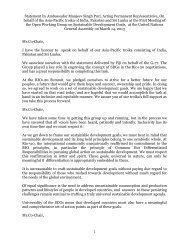STATE OF THE WORLD'S CITIES 2012/2013 Prosperity
STATE OF THE WORLD'S CITIES 2012/2013 Prosperity
STATE OF THE WORLD'S CITIES 2012/2013 Prosperity
Create successful ePaper yourself
Turn your PDF publications into a flip-book with our unique Google optimized e-Paper software.
Chapter 2.4<br />
Equity and the<br />
<strong>Prosperity</strong> of Cities<br />
The past few decades have witnessed a notable surge in<br />
economic growth, but one which has been accompanied<br />
by an equally daunting degree of inequity under various<br />
forms, with wider income gaps and deepening poverty<br />
in many cities across the world. In the 1970s, widening<br />
income gaps began an unhealthy co-existence with<br />
economic growth, with reduced incomes for households in<br />
the middle and lower classes and steady increases for the<br />
well-off. Economic inequality is seriously detrimental to the<br />
equitable distribution among individuals of opportunities<br />
to pursue a life of their<br />
choosing and be spared<br />
Cities must realize from extreme deprivation<br />
FACT that equity has<br />
in outcomes.<br />
a significant impact on<br />
Equity involves<br />
economic performance, systematic (re)distribution<br />
since the greater the degree<br />
of the economic benefits<br />
of equity, the greater the<br />
of growth or development,<br />
chances of a fuller, more<br />
efficient use of available with legal frameworks<br />
resources, including skills ensuring a ‘level playing<br />
and creative talent. field’ and institutions<br />
protecting the rights<br />
of the poor, minorities<br />
and vulnerable groups.<br />
Promotion of equity<br />
also involves enhancing<br />
socioeconomic equality<br />
and providing for civic<br />
participation by all in the<br />
social, political and cultural<br />
spheres.<br />
1<br />
As understood in<br />
FACT this Report urban<br />
prosperity thrives on equity,<br />
which involves reduction<br />
in barriers on individual/<br />
collective potential,<br />
expansion of opportunities,<br />
and strengthening of<br />
human agency2 and civic<br />
engagement.<br />
68<br />
<strong>THE</strong> UNEQUAL WEALTH <strong>OF</strong> <strong>CITIES</strong>: INCREASED<br />
INCOME DISPARITIES<br />
The 2011 OECD report Divided We Stand stresses that<br />
income gaps between rich and poor are expanding in both<br />
developed and developing countries. In OECD countries,<br />
inequalities are as steep as they have been for over 30<br />
years. The Report shows that, in advanced economies, the<br />
average income of the richest 10 per cent of the population<br />
is about nine times higher than that of the poorest<br />
10 per cent. In Europe’s Nordic countries, the average is a<br />
multiple of six but growing,<br />
compared with multiples<br />
of 10 in Italy, Korea and<br />
the United Kingdom, and<br />
up to 14 in Israel, Turkey<br />
and the United States.<br />
These are overshadowed<br />
by countries such as Chile<br />
and Mexico with multiples<br />
of 27, and in Brazil, despite<br />
recent declines in inequity<br />
(the exception among<br />
the BRICs countries), the<br />
ratio of incomes between<br />
richest and poorest reached<br />
a staggering 50:1. 4 In<br />
the 34 OECD member<br />
countries, Gini coefficients<br />
have risen by 10 per cent<br />
on average between the<br />
1980s and the late 2000s<br />
(from 0.29 to 0.316). 5<br />
In emerging economies<br />
(such as Argentina, Brazil,<br />
China, India, Indonesia,<br />
the Russian Federation<br />
FACT<br />
Cities generate<br />
wealth, but it<br />
is not shared equitably.<br />
Despite considerable<br />
increases in capital and<br />
per capita GDP growth<br />
along with reductions<br />
in extreme poverty,<br />
inequality as a whole is<br />
growing in most parts<br />
of the world – a process<br />
that undermines urban<br />
prosperity.<br />
FACT<br />
In many cities,<br />
the population<br />
and local experts<br />
concur that inequalities<br />
are becoming steeper.<br />
A review of inequality<br />
in cities reveals a<br />
steady increase over<br />
the long term, as well<br />
as in recent decades. 3<br />
Paradoxically, this has<br />
occurred as wealth rose<br />
enormously around the<br />
world.



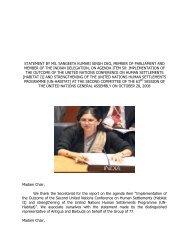
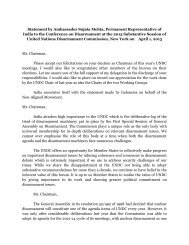
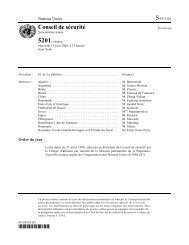
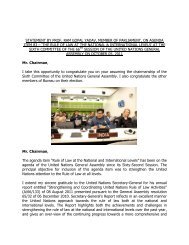
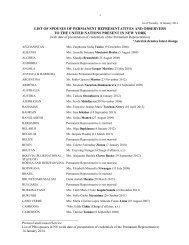
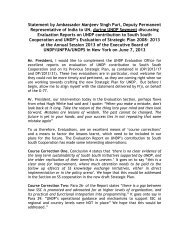
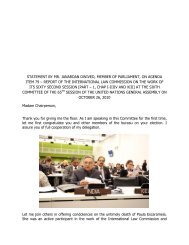
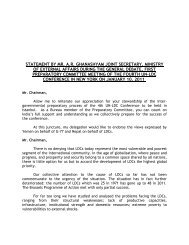
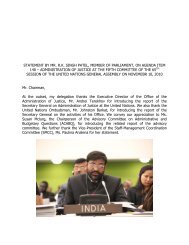
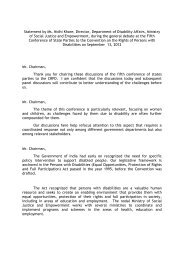
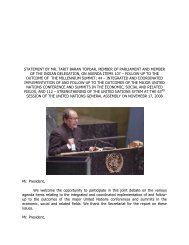
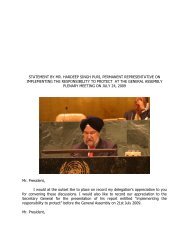
![1 statement by dr.[mrs] kakoli ghosh dastidar - Member States Portal](https://img.yumpu.com/27526598/1/190x245/1-statement-by-drmrs-kakoli-ghosh-dastidar-member-states-portal.jpg?quality=85)
